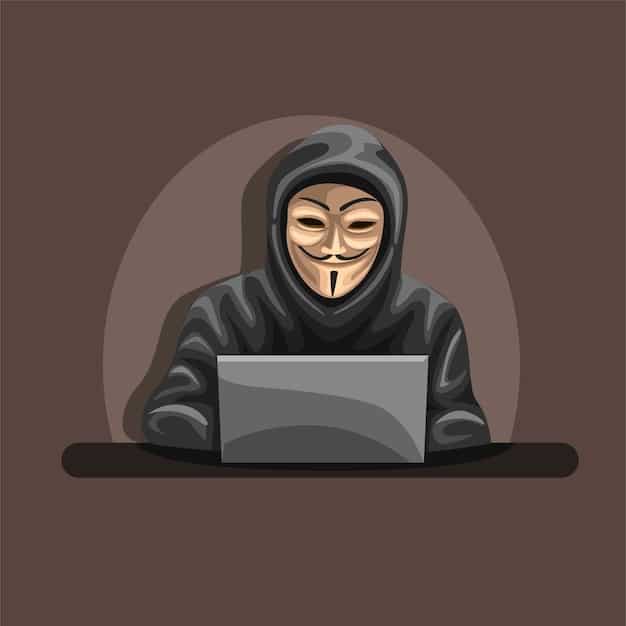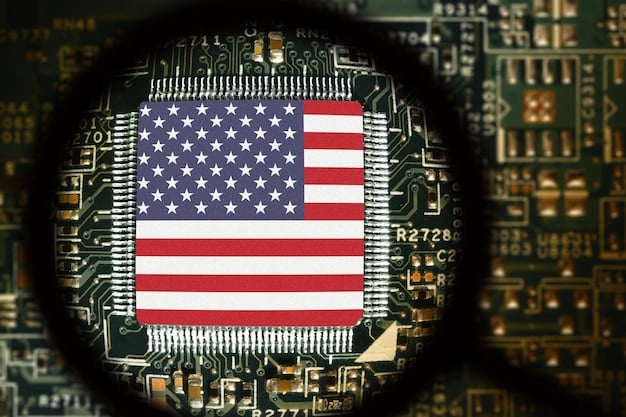Ethical Hacking: How Subcultures Protect US Cybersecurity

Ethical hacking subcultures play a crucial role in bolstering US cybersecurity by identifying vulnerabilities, developing innovative defense strategies, and fostering a community of security experts dedicated to protecting digital assets.
In an increasingly digital world, the need for robust cybersecurity measures has never been greater. Ethical hacking subcultures are emerging as unsung heroes, contributing significantly to protecting the US from ever-evolving digital threats.
The Rise of Ethical Hacking in Cybersecurity
The digital landscape is constantly under siege, with cyberattacks becoming more sophisticated and frequent. This has led to a growing recognition of the importance of ethical hacking, which involves using hacking techniques to identify vulnerabilities and improve security.
Ethical hackers, often operating within various subcultures, play a critical role in safeguarding digital assets. These subcultures are characterized by shared values, practices, and a commitment to using their skills for good.
What is Ethical Hacking?
Ethical hacking involves assessing the security of systems and networks with the permission of the owner. Unlike malicious hackers, ethical hackers aim to identify weaknesses and provide solutions to prevent exploitation.
The Importance of Cybersecurity
Cybersecurity is vital for protecting sensitive data, maintaining business operations, and ensuring national security. In the US, the rise of cyber threats has led to increased investment in cybersecurity measures and a growing demand for skilled professionals.
- Identifying vulnerabilities before malicious actors can exploit them.
- Developing and implementing effective security measures.
- Protecting sensitive data and maintaining business continuity.
- Contributing to national security by safeguarding critical infrastructure.
Ethical hacking and cybersecurity are intertwined, with ethical hacking serving as a proactive approach to identifying and mitigating risks. This field is constantly evolving, requiring continuous learning and adaptation to new threats.
In conclusion, the rise of ethical hacking underscores the critical need for proactive cybersecurity measures. By understanding the role of ethical hackers and the importance of cybersecurity, organizations and individuals can better protect themselves from digital threats.
Understanding Ethical Hacking Subcultures

Ethical hacking is not a monolithic entity; it comprises various subcultures, each with its unique focus and approach. Understanding these subcultures provides insight into the diverse expertise and perspectives within the ethical hacking community.
These subcultures often form around specific technologies, methodologies, or ideologies, contributing to the collective knowledge and capabilities of the ethical hacking field.
Common Subcultures within Ethical Hacking
Several distinct subcultures exist within the ethical hacking community. These include:
- Bug Bounty Hunters: Individuals who actively seek out vulnerabilities in software and systems and report them to vendors in exchange for rewards.
- Capture the Flag (CTF) Enthusiasts: Participants in cybersecurity competitions that involve solving challenges related to hacking, reverse engineering, and cryptography.
- Open Source Security Advocates: Individuals who promote the creation and use of open-source security tools and resources.
How Subcultures Contribute to Cybersecurity
These subcultures contribute to cybersecurity in various ways, including:
Bug bounty hunters help organizations identify and fix vulnerabilities before they can be exploited by malicious actors. CTF enthusiasts develop and refine their hacking skills through challenging competitions, which can then be applied to real-world security assessments. Open-source security advocates create and share tools and resources that can be used by others to improve their security posture.
In conclusion, understanding the diverse subcultures within ethical hacking is essential for appreciating the multifaceted nature of cybersecurity. Each subculture brings unique skills and perspectives to the table, contributing to the collective effort of protecting digital assets.
The Role of Ethical Hacking in Protecting the US
Ethical hacking plays a pivotal role in safeguarding the US from a wide range of cyber threats. By proactively identifying vulnerabilities and developing innovative security solutions, ethical hackers contribute significantly to national security and economic stability.
Their efforts help protect critical infrastructure, government networks, and private sector businesses from malicious attacks.

Defending Critical Infrastructure
Critical infrastructure, such as energy grids, transportation systems, and financial networks, are prime targets for cyberattacks. Ethical hackers help defend these systems by identifying vulnerabilities and developing security measures to prevent disruptions.
Ethical hackers conduct penetration testing, vulnerability assessments, and security audits to identify weaknesses in critical infrastructure systems. They then provide recommendations for improving security and mitigating risks.
Combating Cybercrime
Cybercrime poses a significant threat to individuals, businesses, and governments. Ethical hackers play a crucial role in combating cybercrime by investigating attacks, identifying perpetrators, and developing strategies to prevent future incidents.
Ethical hackers assist law enforcement agencies in investigating cybercrimes by providing technical expertise and forensic analysis. They also work with businesses to develop incident response plans and implement security measures to prevent future attacks.
In conclusion, ethical hacking is an essential component of the US’s cybersecurity strategy. By defending critical infrastructure, combating cybercrime, and protecting sensitive data, ethical hackers contribute significantly to national security and economic prosperity.
The Legal and Ethical Considerations of Ethical Hacking
While ethical hacking is a valuable tool for improving cybersecurity, it is essential to understand the legal and ethical considerations involved. Ethical hackers must operate within the boundaries of the law and adhere to ethical principles to avoid legal repercussions and maintain public trust.
Failure to do so can result in severe legal penalties and damage to their reputation.
Legal Frameworks for Ethical Hacking
Several laws and regulations govern ethical hacking activities in the US. These include:
- The Computer Fraud and Abuse Act (CFAA): This law prohibits unauthorized access to computer systems.
- The Digital Millennium Copyright Act (DMCA): This law addresses copyright issues related to digital content.
- State Laws: Many states have their own laws regulating computer crime and data security.
Ethical Guidelines for Ethical Hackers
In addition to legal requirements, ethical hackers must adhere to a set of ethical guidelines. These guidelines include:
Obtaining explicit permission before conducting any security assessments, maintaining confidentiality and protecting sensitive data, disclosing vulnerabilities responsibly and providing sufficient time for remediation, and avoiding any actions that could cause harm to systems or individuals.
Ethical hackers must stay informed about changes in laws and regulations, seek legal counsel when necessary, and uphold the highest ethical standards in their work.
In conclusion, ethical hacking is a powerful tool that must be used responsibly and ethically. By understanding and adhering to legal frameworks and ethical guidelines, ethical hackers can contribute to cybersecurity while maintaining public trust and avoiding legal consequences.
The Future of Ethical Hacking and Cybersecurity
The field of ethical hacking and cybersecurity is constantly evolving, driven by technological advancements and the ever-changing threat landscape. As new technologies emerge, so do new vulnerabilities, requiring ethical hackers to adapt and develop new skills.
Several trends are shaping the future of ethical hacking and cybersecurity, including:
Artificial Intelligence (AI) and Machine Learning (ML)
AI and ML are being used to automate security tasks, detect threats, and improve incident response. Ethical hackers are leveraging AI and ML to enhance their capabilities and stay ahead of malicious actors.
AI and ML are being used to develop more sophisticated cyberattacks. Ethical hackers are developing AI-powered defense mechanisms to counter these attacks.
The Internet of Things (IoT)
The proliferation of IoT devices has created a vast attack surface. Ethical hackers play a vital role in securing IoT devices and networks by identifying vulnerabilities and developing security measures.
Ethical hackers are conducting penetration testing on IoT devices, developing secure coding practices for IoT software, and implementing security protocols to protect IoT networks.
Cloud Security
The adoption of cloud computing has transformed the way organizations store and process data. Ethical hackers are essential for ensuring the security of cloud environments by identifying vulnerabilities and implementing security controls.
Ethical hackers are conducting security audits of cloud infrastructures, developing secure cloud configurations, and implementing data encryption and access control measures.
In conclusion, the future of ethical hacking and cybersecurity is bright, with new opportunities and challenges emerging constantly. By embracing new technologies, developing new skills, and fostering collaboration, ethical hackers can continue to play a vital role in protecting the US from digital threats.
How to Get Involved in Ethical Hacking Subcultures
For individuals interested in getting involved in ethical hacking subcultures, there are numerous resources and opportunities available. Whether you’re a student, IT professional, or simply curious about cybersecurity, there is a place for you in the ethical hacking community.
One of the best ways to learn and grow in this field is by actively participating with others and sharing knowledge. Many avenues exist for you to get started!
Educational Resources
Various educational resources are available for learning about ethical hacking and cybersecurity. These include:
- Online Courses: Platforms like Coursera, Udemy, and Cybrary offer courses on ethical hacking, penetration testing, and cybersecurity.
- Certifications: Certifications such as Certified Ethical Hacker (CEH), Offensive Security Certified Professional (OSCP), and CompTIA Security+ validate your skills and knowledge.
- Academic Programs: Many universities and colleges offer degree programs in cybersecurity and related fields.
Community Engagement
Engaging with the ethical hacking community is essential for learning, networking, and collaborating. You can get involved by:
Attending cybersecurity conferences and workshops, joining online forums and communities, and participating in Capture the Flag (CTF) competitions.
Hands-On Experience
Gaining hands-on experience is crucial for developing your ethical hacking skills. You can start by:
Setting up a home lab to practice hacking techniques, contributing to open-source security projects, and participating in bug bounty programs.
In conclusion, getting involved in ethical hacking subcultures is a rewarding and fulfilling experience. By leveraging educational resources, engaging with the community, and gaining hands-on experience, you can develop the skills and knowledge needed to contribute to cybersecurity professionally.
| Key Point | Brief Description |
|---|---|
| 🛡️ Ethical Hacking | Proactive identification of vulnerabilities to enhance cybersecurity. |
| 🧑💻 Subcultures | Diverse groups contributing unique expertise, e.g., bug bounty hunters. |
| ⚖️ Legal Aspects | Compliance with laws like CFAA and ethical guidelines crucial. |
| 🚀 Future Trends | AI, IoT, and cloud security shaping the future of ethical hacking. |
Frequently Asked Questions (FAQ)
Ethical hacking involves legally breaking into computers and devices to test an organization’s defenses. It’s a way to identify vulnerabilities and secure systems from malicious attacks.
Ethical hackers protect the US by safeguarding critical infrastructure, government networks, and private-sector businesses from cyber threats. They identify and mitigate risks proactively.
Ethical hackers must comply with laws like the Computer Fraud and Abuse Act (CFAA) and state laws. They need permission before assessments and must protect sensitive data.
Important skills include networking knowledge, programming, cryptography, and a deep understanding of operating systems. Analytical and problem-solving skills are also crucial.
Start with online courses, certifications like CEH, and hands-on practice by setting up a home lab. Engage with the cybersecurity community through forums and CTF competitions.
Conclusion
Ethical hacking subcultures are vital in protecting the US from digital threats. By identifying vulnerabilities, developing innovative solutions, and fostering a community of skilled professionals, these subcultures play a critical role in maintaining national security and economic stability in the digital age.





